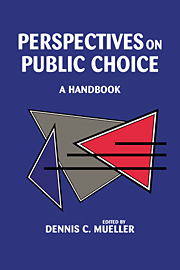Book contents
- Frontmatter
- Contents
- Preface
- Contributors
- 1 Public choice in perspective
- Part I The need for and forms of cooperation
- Part II Voting rules and preference aggregation
- Part III Electoral politics
- 12 The spatial analysis of elections and committees: Four decades of research
- 13 Multiparty electoral politics
- 14 Interest groups: Money, information, and influence
- 15 Logrolling
- 16 Political business cycles
- Part IV Individual behavior and collective action
- Part V Public choice in action
- References
- Name index
- Subject index
14 - Interest groups: Money, information, and influence
Published online by Cambridge University Press: 04 May 2010
- Frontmatter
- Contents
- Preface
- Contributors
- 1 Public choice in perspective
- Part I The need for and forms of cooperation
- Part II Voting rules and preference aggregation
- Part III Electoral politics
- 12 The spatial analysis of elections and committees: Four decades of research
- 13 Multiparty electoral politics
- 14 Interest groups: Money, information, and influence
- 15 Logrolling
- 16 Political business cycles
- Part IV Individual behavior and collective action
- Part V Public choice in action
- References
- Name index
- Subject index
Summary
Although there are a great many issues concerning interest group formation (Olson 1965; Grier, Munger, and Roberts 1991; Kennelly and Murrell 1991), organization, and activity (Austen-Smith 1981; Moe 1981; Johnson 1988), membership and objectives (Rothenberg 1988, 1992), that are germane to our understanding of the political process, this essay is confined exclusively to (relatively recent) models of interest groups' efforts to influence policy through money and information.
This essay will (1) motivate the need to remove the “black box” characterizing much economic modeling of government by discussing the highly aggregated production function approach to interest group behavior exemplified by Becker (1983), (2) deal (in the second and third sections, respectively) with more micro-oriented models involving money at the electoral and the legislative stages of the political process, and (3) review (in the fourth and fifth sections) the literature on interest groups as strategic providers of policy-relevant information which, though a major concern in the descriptive political science literature, has only recently received attention in the formal literature.
The aggregate production function approach
Aggregate level models of interest group influence adopt a production function approach to the political process. The canonic model here is Becker's (1983, 1985)1, which assumes a given number of interest groups and posits the existence of an influence function and a pressure production function for each. Although there is a substantive distinction to be made between influence and pressure (Potters 1992), the separation of the two plays no role in Becker's model or any other that uses such a reduced form for the political sector.
- Type
- Chapter
- Information
- Perspectives on Public ChoiceA Handbook, pp. 296 - 321Publisher: Cambridge University PressPrint publication year: 1996
- 19
- Cited by



